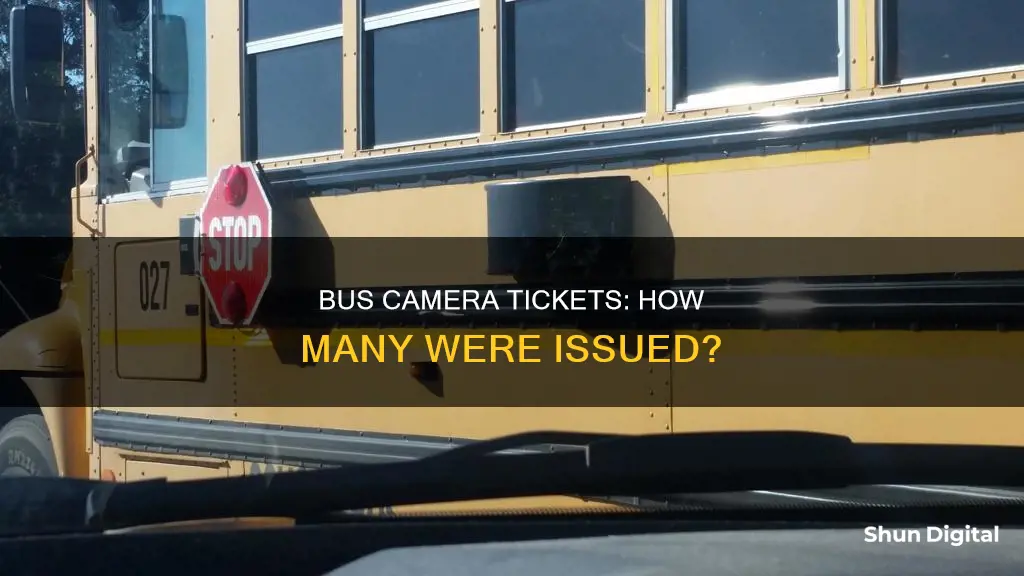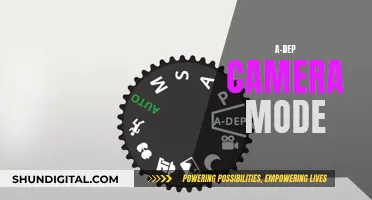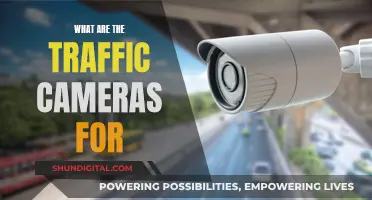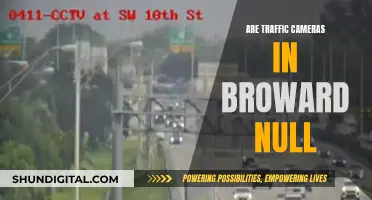
School bus cameras are an increasingly common method of enforcing traffic laws and ensuring the safety of children. These cameras are typically activated when the bus's flashing lights are on and the stop bar is extended, capturing images of vehicles that pass by illegally. In New York, the state legislature has strengthened the law supporting the use of these cameras, allowing local governments to install them and issuing fines ranging from $250 to $300 for violations. Maryland has a similar program, with a $250 civil fine for passing a stopped school bus. While these camera-issued tickets are civil infractions without points on a driver's record, they have sparked some controversy, with drivers contesting tickets in court due to concerns about the accuracy of the technology.
| Characteristics | Values |
|---|---|
| Number of tickets issued for passing a school bus in New York State in 2021 | 2,155 |
| Number of tickets issued for passing a school bus in New York State in 2023 | 2,510 (preliminary figure) |
| Fines for violators in New York | $250 for a first offense, $275 for a second offense, $300 for a third offense committed within 18 months |
| Fines for violators in Pittsburgh | $300 |
| Fines for violators in Montgomery County, Maryland | $250 |
What You'll Learn
- School bus camera tickets are civil violations, like parking tickets
- The registered owner of the vehicle is responsible for the ticket
- The ticket can be contested if the owner was not driving the vehicle
- The ticket includes date, time, registration number, camera ID, and instructions to contest
- The number of tickets issued for passing a school bus rose from 2,155 in 2021 to 2,510 in 2023

School bus camera tickets are civil violations, like parking tickets
School bus camera tickets are civil violations, much like parking tickets. They do not carry the same weight as a ticket issued by a police officer. While a ticket from a police officer for passing a school bus can carry heavier fines of up to $400 for a first offence and 5 points on your license, a ticket issued by a camera is a civil penalty and will not affect your driving record or insurance rates.
The only penalty for a ticket issued by a school bus camera is a fine set by statute. The fine for a first violation is $250, $275 for a second violation within 18 months, and $300 for each subsequent violation within the same period. These fines are intentionally set high to deter people from breaking the law, but not so high that it is worth it for people to fight their case.
If you receive a ticket issued by a school bus camera, you have the right to see the evidence against you. You can request a court date and view the video evidence online. You may pay the fine, which is an admission of guilt, or you can dispute the violation and request a hearing. If you were not driving the vehicle, you can provide a statement and identify the person who was driving.
It is important to note that these camera tickets are not criminal charges and will not result in a criminal record. They are civil infractions, and as such, there is a lower burden of proof required to convict compared to criminal matters.
Minolta X-700: What Battery Powers This Classic Camera?
You may want to see also

The registered owner of the vehicle is responsible for the ticket
It is important to understand that the primary purpose of school bus camera enforcement is to improve student safety and reduce stop-arm running incidents. The responsibility for ensuring compliance with school bus laws ultimately falls on all road users. This includes obeying the rules and being vigilant when sharing the road with school buses.
When a school bus camera captures a violation, the image or video evidence is typically reviewed and validated by trained staff or law enforcement personnel. Only then is a ticket generated and mailed to the registered owner of the vehicle. It is crucial to emphasize that the registered owner of the vehicle is legally responsible for the ticket, regardless of who was driving at the time of the infraction. This is consistent with how most traffic violations are handled, where the vehicle's registered owner is held accountable.
When a ticket is issued, it will include clear information about the nature of the violation, the date, time, and location of the incident, and instructions on how to review the evidence and pay the fine. The amount of the fine varies depending on local laws and the severity of the offense, but it is typically treated as a civil penalty. Paying the fine is usually an acknowledgment of responsibility for the violation.
In some jurisdictions, failure to pay the fine or contest the ticket within a specified timeframe can result in additional penalties, such as late fees or even escalation to a criminal offense. It is in the best interest of the registered owner to address the ticket promptly and follow the necessary steps to resolve it. This may include paying the fine, providing evidence that the vehicle or license plate was stolen, or demonstrating that the school bus stop arm was deployed erroneously.
Low Battery, Low Quality: Camera Performance Impact
You may want to see also

The ticket can be contested if the owner was not driving the vehicle
In Montgomery County, Maryland, if you were not the person driving your vehicle when it was caught on camera passing a stopped school bus, you can contest the ticket. As the registered owner, you must provide a statement swearing that you were not the driver at the time of the violation. You must also provide the full name and address of the person who was driving, as well as your daytime phone number. This request must be received no later than 30 days after the mail date of the citation and sent to the Automated Traffic Enforcement Unit in Gaithersburg, Maryland.
In New York, if you own the car but were not driving it when the violation occurred, you are still responsible for the ticket, provided your car was not stolen. However, if your car was leased or rented, the owner has 37 days to provide a lease or rental agreement to authorities, after which the lessee or renter would be liable for the fine.
In general, when it comes to traffic tickets, the driver is responsible for paying the ticket, and the violation will follow them, not the owner of the vehicle. The driver may also face insurance penalties and added points on their driving record, which could potentially lead to license suspension. However, if the owner of the vehicle lent their car to the driver despite their insurance company prohibiting it, they may also face repercussions from their insurance company.
Mastering Camera Mode in Elite Dangerous
You may want to see also

The ticket includes date, time, registration number, camera ID, and instructions to contest
School bus camera tickets are a growing phenomenon, with many local governments and school districts adopting this technology to improve road safety. The number of tickets issued for passing a school bus has increased slightly from 2,155 in 2021 to 2,510 in 2023.
The ticket includes the date, time, registration number, camera ID, and instructions to contest, which is an important aspect of the process. Here's a more detailed breakdown of these components:
Date and Time: The date and time of the incident are included in the violation notice. This information helps individuals recall the specific circumstances and plan their next steps.
Registration Number: The registration number of the vehicle captured by the camera is included in the ticket. This information identifies the vehicle and allows authorities to trace its owner.
Camera ID: The identification number of the camera that captured the violation is also provided. This detail adds transparency and enables individuals to verify the evidence if needed.
Instructions to Contest: The ticket will include instructions on how to contest the fine. Individuals have the right to view the evidence and challenge the ticket if they believe it was issued in error. The process may involve requesting a hearing, providing statements, or submitting relevant documentation.
It is important to note that the specific procedures for contesting a ticket may vary depending on the location and governing laws. Individuals should carefully review the instructions provided on their ticket and follow any local requirements or guidelines.
The inclusion of these details in the ticket—date, time, registration number, camera ID, and instructions to contest—ensures a transparent and informative process for individuals who receive a school bus camera ticket. It empowers them to make informed decisions and take appropriate actions, whether that involves paying the fine or pursuing a contestation.
Camera Tickets: Are They Legally Binding?
You may want to see also

The number of tickets issued for passing a school bus rose from 2,155 in 2021 to 2,510 in 2023
The number of tickets issued for passing a school bus has been rising. Between 2021 and 2023, the figure rose from 2,155 to 2,510. This increase is likely due to the growing use of school bus cameras, which have been implemented to improve road safety for children.
School bus cameras are typically installed to monitor vehicles passing stopped school buses with their overhead red lights flashing and the "'stop'" bar extended. The cameras capture images of vehicles that pass by, and the evidence is then used to issue tickets to the vehicle owners. The fine for this violation is usually $250, and it is treated as a civil violation, similar to a parking ticket. The registered owner of the vehicle receives the violation notice, regardless of who was driving.
The use of school bus cameras has been controversial, with some people contesting the tickets they receive. In some cases, individuals have successfully argued that the evidence from the cameras was insufficient to prove that the bus was a properly marked school bus or that it was loading or unloading students when the car passed. However, legislators have taken steps to address these concerns by clarifying the rules surrounding the use of bus camera evidence and shifting the burden of proof to motorists.
The increase in the number of tickets issued for passing a school bus highlights the importance of road safety around schools. The use of school bus cameras is intended to deter dangerous driving behaviour and protect children from potential harm. While there have been some challenges to the effectiveness and accuracy of these systems, the overall goal of improving safety for schoolchildren remains a key priority.
Best Cameras for RAW Photography Enthusiasts
You may want to see also
Frequently asked questions
All Montgomery County school buses were equipped with enforcement cameras as of September 2019. While the exact number of tickets issued is not known, the county provides a website where violators can view their violation videos.
In 2023, 2,510 tickets were issued by school bus camera in New York State, up from 2,155 in 2021.
There is no limit to the number of tickets a school bus camera can issue. The bus camera will issue a ticket to any vehicle that passes the bus while its flashing lights are on and its "stop" bar is extended.
The fine for a ticket issued by a school bus camera varies by location. In New York, the fine is $250 for a first offense and $300 for a third offense within 18 months. In Montgomery County, MD, the fine is $250. In Pittsburgh, the fine is $300.
If you receive a ticket from a school bus camera that you believe was issued in error, you can fight the ticket in court. However, if you choose to fight the ticket, you may be responsible for additional court fees if you lose the case.







